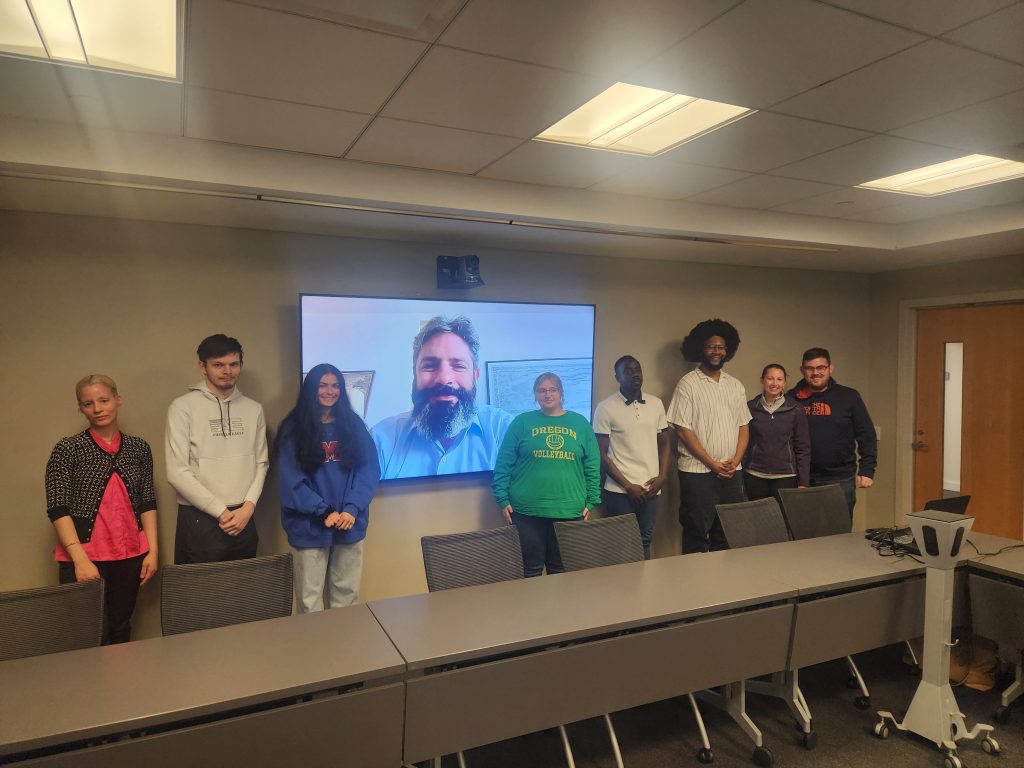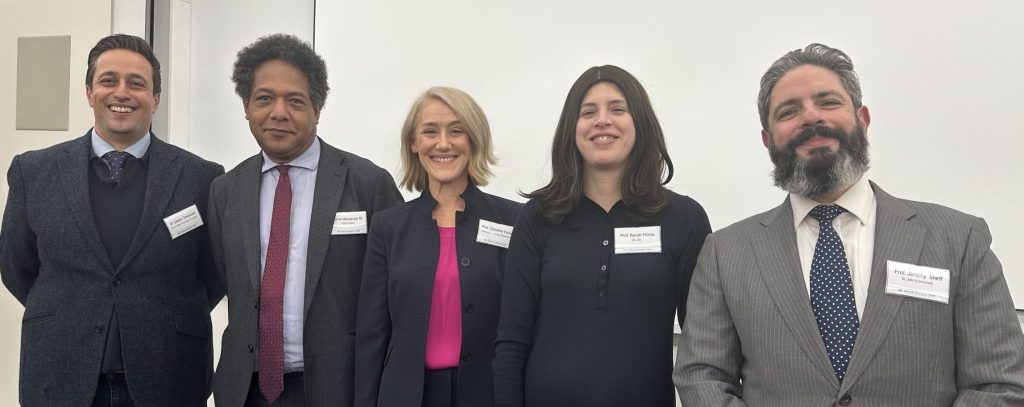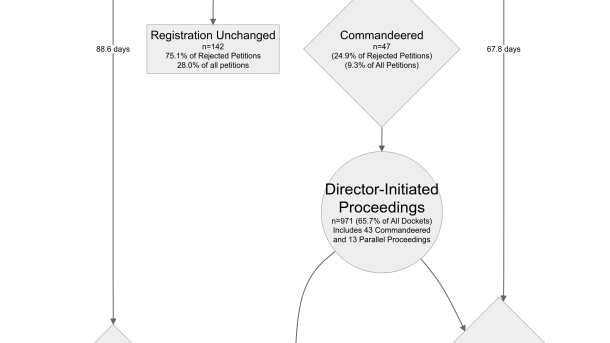This spring in my Property Law class, there were allegations that some of my students may have used generative AI to assist them in taking my final exam. The incident led me to give some serious thought to how we are dealing with these tools in the professional education context, and what I ought to say to my students about it. Every year once grades are submitted I circulate a memo explaining to my students what I was looking for on the exam and how I calculated their grades; this year that memo included a lengthy discussion on AI and legal education. In case its of interest to anyone else dealing with these issues, here’s what I wrote:
As you know, the final exam for our course was an open-book, open-note, open-internet exam. I designated an open-internet format for our exam because of the various online resources I have assigned to you over the course of the semester or referred to in the casebook, and my intention that you have access to any such materials that you might find useful in taking the exam. Shortly after the exam administration, several students reached out to me or to the Law School administration to indicate their belief that some students had used generative AI tools to assist them in taking the exam. Such tools are prohibited by the plagiarism policy of the Code of Student Professional Responsibility set forth in the Student Handbook (see p. 46) and by our course syllabus, and their use on an exam would constitute serious academic misconduct.
I have no direct evidence that any particular student used generative AI tools to assist them on the final exam. The fact that exam questions were distributed only in hard copy, combined with the fact that the exam administration software does not allow cutting and pasting, would have made doing so moderately difficult under time pressure. My read of your exam essay answers suggests that students did not use generative AI tools in any meaningful way on that section of the exam. But the average score on the multiple choice section was significantly higher this year than in previous years, and the correlation between each student’s multiple choice score and their essay score was weaker than in previous years, which could support an inference that some students may have used generative AI tools to assist them in answering multiple choice questions. Indeed, there are a few students who performed near the top of the class on the multiple choice section of the final exam but near the bottom of the class on the essay section, which would further support such an inference. But this disparity standing alone, in my view, is insufficient evidence to support the serious charge of academic misconduct against any particular student, nor has the administration uncovered any direct evidence of such misconduct. So rather than making this a disciplinary matter, I want to take this opportunity to discuss how you all are integrating these new technological tools into your professional lives.
I have no doubt that you will use generative AI tools in one manner or another in your legal practice. They will have a place in the legal profession, as they will in many professions. But they can also be misused, and when misused they can do serious harm. You are all hopefully familiar by now with stories of attorneys[1] and government officials[2] who have been caught using generative AI tools to do their professional work for them, generating work product that contains fabricated citations to nonexistent authority, and resulting in serious substantive errors. I hope you have followed these cases closely enough to know that lawyers who outsource their work product to generative AI tools in this way have already faced serious adverse consequences, including thousands of dollars in sanctions as well as referrals for further professional discipline. I hope you also recognize that these lawyers’ reputations, their ability to earn a livelihood, and perhaps even their licenses to practice law, have been seriously and perhaps irreparably endangered by their undue reliance on generative AI tools. These lawyers delivered work product that real people were relying on to protect their rights, and that work product turned out to be not merely worthless but actually harmful to their clients’ interests. In so doing, these lawyers showed that their clients’ reliance was seriously misplaced.
You may recall our discussion of the robo-signing scandal of the 2008 foreclosure crisis, in which attorneys shirked their responsibilities of care and candor to the courts in order to retain their employment by clients whose only interest was in having their money move around a little faster. You may recall that we dwelt on the implications of that dereliction of professional responsibility for the reputation of the legal profession as a whole and for the integrity of the legal system that we depend on to secure titles to real property across the United States. We can, and should, see undue reliance on generative AI tools—and indeed on any tool—in the same light. Ask yourself: why would society tolerate a legal profession that outsources all its professional obligations to someone else? What value does such a profession provide? Why would anyone need or even want a lawyer if this is all a lawyer is good for? And if a society finds it cannot depend on its lawyers, how can it hope to maintain governance under law?
As I’ve said to you several times over the course of this past semester, I believe in the value of law and of the legal profession. I’ve tried to convince you that you should believe in these things too, and that you have a personal responsibility for the reputation of our profession. If I’ve succeeded in that effort at all, you should understand the problem with using a generative AI tool to help you complete a law school assessment, and you should see why such use is prohibited by our code of student professional responsibility absent specific permission from your instructor. A lawyer is more than a prompt engineer: they have knowledge, skills, experience, and judgment. And law is not just a corpus of text to be processed: it is an interrelated set of institutions, traditions, agents, practices, and facts in the world that are literally invisible to the large language models that power generative AI tools. If those tools are going to be useful in the practice of law, it will only be because they assist actual legal professionals in dealing with those parts of the legal system that large language models can access. The phenomenon of AI-hallucinated citations demonstrates that one of the things these models cannot access is the web of relationships between text, authority, legal institutions, legal rules, and the practices of reason-giving. And if the first year of law school is about anything, it is about teaching you how to understand and work with those relationships.
You are currently undertaking the education you need to become proficient lawyers. That process is slow and difficult, because being a proficient lawyer—a professional whom people can trust to defend and assert their rights in a society governed by law—is not an easy thing to do. A year ago, if someone had given you a citation to a statute and told you that it stood for the proposition that you and your family should be forcibly expelled from the United States, you probably would not have been able to determine for yourself whether that statute even existed. Nine months ago, if someone had given you the text of a judicial opinion and told you that it stood for the proposition that your neighbor was entitled to all of your property, you probably would have had a very hard time determining whether they were telling you the truth—if indeed you could have done so at all. Your legal education consists in part in developing the knowledge and skills that allow you to perform these tasks—to identify legal authorities and to understand what they mean and how they can be used to resolve real disputes among real people, or between people and their government, through the institutions of the law. If you are outsourcing that work to a technological tool now, what value are you preparing yourself to provide to anyone later? If someone in the future tries to take away your clients’ rights, their property, their liberty, or their life, based on a lie, how would you ever be in a position to prevent it? Why would anybody ever seek your help, let alone be willing to pay you for it?
This is not to say that in the hands of a legal professional who understands the law and its institutions, who can critically engage with legal authorities and arguments, and who can marshal those authorities and arguments in service of their clients’ interests, a technology that speeds up some of the more routine tasks of legal work would lack value. It is merely to say that you are not there yet. You are in law school to start building the skills and knowledge that will put you in a position to know which tasks can be delegated and which you need to do yourself: to be able to recognize when your tools are helping you and when they are getting in your way, and to be able to detect when they are lying to you. There is no short cut to that kind of professional expertise; it is something that you build with time and effort. That is why we call the work that professionals do “practice”—it is a set of specialized behaviors that you get better at by doing them. To be in a position to know whether the output of a generative AI tool is right or wrong, helpful or harmful, you first need to have the knowledge and skills that would have enabled you to generate such an output yourself. You cannot verify the quality, utility, or truthfulness of work that you never learned how to perform in the first place. And if you aren’t learning how to do that work now, when only your grades are at stake, you are not going to be able to do that work later in your career, when real people will be depending on you to defend their rights.
I know that these days it can feel like everybody is using generative AI tools to acquire educational credentials without putting in the effort that is supposed to justify those credentials.[3] And in an environment where it seems like everybody is cutting corners, it can make you feel like a sucker to keep doing the actual work you set out to do. I get it. But I encourage you to focus on what it is you are trying to achieve here. You are not in law school to get good grades in law school. You are not even in law school just to get a good job out of law school. You are in law school to become a lawyer. Everything else—the grades, the summer internship, the first job after graduation—is just one more step on a path that you will be on for the rest of your working life. Life is long, and walking that path is going to require you to be able to do things that you are currently in law school to learn how to do—things that nobody is born knowing how to do, and that you will be expected to be able to do by the time you graduate. If you haven’t figured out how to do all those things by the end of your first year of law school, that is OK. Part of the reason my faculty colleagues and I assess you with things like exams is to figure out which of you needs more help to become a proficient lawyer, and how we might best deliver that help to you. We can’t do that for you if you are substituting someone else’s performance on those assessments for your own. And even if a grade you didn’t earn helps you get a job you might not otherwise have gotten, I promise it will neither help you to do that job, nor help you to keep it.
So I hope that you will choose to do the work, even when it’s hard. I hope that you will reject the temptation of the shortcut that trades your long-term professional competency and prospects for the expediency of a short-term advantage that can only evaporate over time, leaving you farther behind. My faculty colleagues and I remain ready to help you do the work of becoming a lawyer, and to help you learn to do the things you’re still having trouble doing on your own. That is the work we have all dedicated our professional lives to doing. It’s a commitment that I’ve made because I believe we need good lawyers. And as I’ve told you, I believe you can all become such lawyers if you are willing to seek help when you need it, to support one another when called on to do so, and to do the work.
Prove me right.
[1] Park v. Kim, No. 20-CV-02636, at *6-*12 (2d Cir. Jan. 30, 2024), available at https://fingfx.thomsonreuters.com/gfx/legaldocs/egvbaanybpq/2nd%20Circuit%20Decision.pdf; Mata v. Avianca, Inc., No. 22-cv-01461 Opinion and Order on Sanctions (S.D.N.Y. Jan. 22, 2023), https://storage.courtlistener.com/recap/gov.uscourts.nysd.575368/gov.uscourts.nysd.575368.54.0_2.pdf; Garner v. Kadince, 2025 UT App 80 (2025), available at https://law.justia.com/cases/utah/court-of-appeals-published/2025/20250188-ca.html.
[2] Dani Blum & Maggie Astor, White House Health Report Included Fake Citations, N.Y. Times (May 29, 2025), https://www.nytimes.com/2025/05/29/well/maha-report-citations.html; Phie Jacobs, Trump Officials Downplay Fake Citations in High-Profile Report on Children’s Health, Science Insider (May 30, 2025), https://www.science.org/content/article/trump-officials-downplay-fake-citations-high-profile-report-children-s-health.
[3] James D. Walsh, Everyone Is Cheating Their Way Through College, New York: Intelligencer (May 7, 2025), https://nymag.com/intelligencer/article/openai-chatgpt-ai-cheating-education-college-students-school.html; D. Graham Burnett, Will the Humanities Survive Artificial Intelligence?, The New Yorker (Apr. 26, 2025), https://www.newyorker.com/culture/the-weekend-essay/will-the-humanities-survive-artificial-intelligence; Phil Christman, Of Course Some Will Cheat, Slate (May 14, 2025), https://slate.com/life/2025/05/college-student-cheating-ai-detector-chatgpt-school-education.html.



